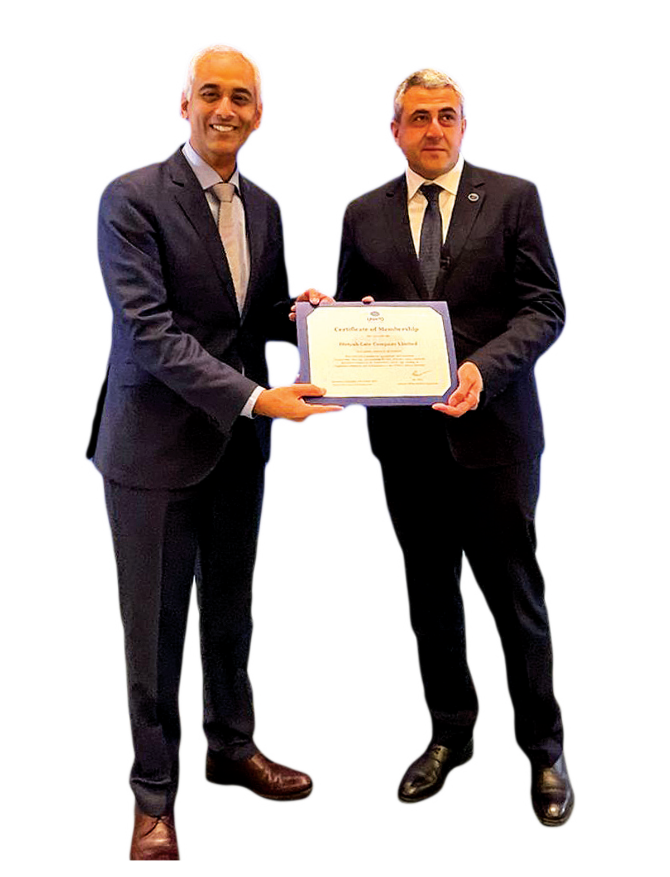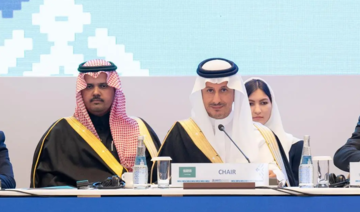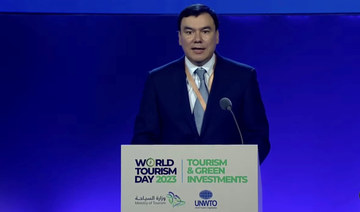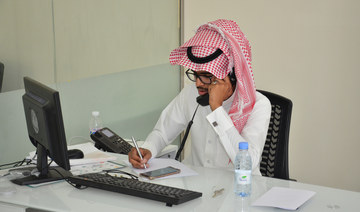SAMARKAND, Uzbekistan: The quaint historic town of Samarkand, Uzbekistan, which was founded in the 7th century BC, sprung into life this week when high-level delegates, ministers and distinguished guests from more than 150 countries came together for the 25th session of the General Assembly of the UN World Tourism Organization. Held between Oct. 16-20, the Saudi presence was evident throughout the festivities.
On a sunny Samarkand day – after a rainy night – it was announced that Diriyah Co. from Saudi Arabia would officially join the UNWTO as an affiliate member, in a significant move towards fostering global tourism collaboration and advancing the Kingdom’s tourism sector globally. Affiliate Members normally form an integral part of the UNWTO Membership and significantly contribute to a more sustainable, innovative, and collaborative global sector.
As an affiliate member, Diriyah Co. issued a statement announcing it “would actively engage with UNWTO and its global network to collaborate on initiatives, share insights, and support the organization’s mission of making tourism a force for positive change around the world.”
It added: “This partnership is set to enhance the cultural exchange, heritage preservation, and sustainable tourism efforts undertaken by Diriyah Co.”
The company also stated that the collaboration would facilitate discussions on sustainability, innovation and inclusivity in the tourism sector, all of which are essential components of its ongoing efforts to transform the historic city of Diriyah into a vibrant tourist destination.
Diriyah Co.’s affiliation with the UNWTO would also be seen as a testament to Saudi Arabia’s global commitment to advancing the tourism industry globally as well as promoting responsible travel and preserving the world’s cultural and historical heritage.
Under the guidance of Crown Prince Mohammed bin Salman, the Diriyah giga-project has been in alignment with the UN’ Sustainable Development Goals since its start, as it primarily focused on urban regeneration and sustainable development in the area often seen as the birthplace of the Kingdom.
The Diriyah Project, a flagship initiative within Vision 2030, has been central to the Kingdom’s transformation agenda. The $63.2 billion investment pipeline has added around $18.6 billion to the Kingdom’s gross domestic product and is estimated to create 178,000 direct jobs. It also aims to attract 50 million visitors a year by 2030.

As an affiliate member, Diriyah Co. will actively engage with UNWTO and its global network. (Supplied)
Saudi Arabia’s Minister of Tourism Ahmed Al-Khateeb – who also serves as chairman of Diriyah Gate Development Authority – was present at the General Assembly, and said: “Tourism connects people, cultures, and economies. In our shared global future, tourism plays a crucial role in promoting sustainability, collaboration and economic prosperity. Because of this, I am absolutely delighted that Diriyah is an Affiliate Member of the UNWTO – marking a significant milestone in Saudi Arabia’s commitment to global tourism collaboration.”
Secretary-General of the UNWTO Zurab Pololikashvili added: “Diriyah’s commitment to preserving its rich cultural heritage while promoting sustainable tourism aligns seamlessly with UNWTO’s mission. This affiliation is a testament to the Kingdom’s dedication to making tourism a force for positive change globally, and I look forward to the invaluable contributions Diriyah Co. will bring to our international network. There is only one Diriyah.”
This was not the first mention of the Kingdom during the UNWTO.
In a video announcement, the audience at the UNWTO General Assembly was treated to a clip regarding the new Riyadh School of Tourism and Hospitality.
“One of the first initiatives of the UNWTO’s regional office (in Riyadh) was to develop the Riyadh School of Tourism and Hospitality – dedicated to supporting the ambitions of the new generation of tourism leaders,” Basmah Al-Mayman told Arab News. Al-Mayman is the Middle East regional director at the UNWTO, and the first national from a Gulf Cooperation Council country to become director of that department since the agency was established more than three decades ago.
Al-Mayman, who was also present at the event, said that an agreement was signed between the Ministry of Tourism in the Kingdom and the UNWTO to develop this groundbreaking e-learning platform. As a result, this established the first tourism academy in Riyadh – and the first such dedicated space in the region. It would “aspire to be the largest multicultural educational environment in the world and a leading global center of excellence, redefining tourism and hotel education,” she added.
Meanwhile, in the Uzbek capital of Tashkent, strengthening relations between the two countries has been morphing from within for some time.
“Over these two years, Saudi-Uzbek relations have reached a new level of unprecedented development and progress. The Saudi-Uzbek relations can be described as exemplary,” the Kingdom’s ambassador to the Asian country, Yousef Saleh Algahrah Al-Otaibi, told Arab News. He was also present at the event.
He recalled the historic visit in 2022 when the President of Uzbekistan, Shavkat Mirziyoyev, traveled to the Kingdom and met with the Crown Prince. During that visit, many agreements and memorandums of understanding were signed – both at the government level and at the private sector level. President Mirziyoyev also visited the Kingdom again in 2023, which has pushed both countries to an even stronger position in bilateral relations.
He also mentioned how the two countries have been giving each other power – literally.
“The Saudi ACWA Power is the largest company investing in the field of electricity and renewable energy sources; the company’s investments in Uzbekistan will reach $15 billion, so the company’s investments will become the largest outside the Kingdom of Saudi Arabia,” Al-Otaibi added.
ACWA Power has also contributed significantly to the modernization of Uzbekistan’s infrastructure.
Al-Otaibi’s next plan is to seek cooperation with officials in Uzbekistan to create suitable conditions to attract fresh Saudi investments in the country. One promising avenue is the Islamic Development Bank, and the ambassador mentioned how it already plays a vital role in providing loans for the implementation of vital projects exceeding $2 billion.
“This is an important role of the bank in Uzbekistan, and it aims to contribute to the modernization of the infrastructure of Uzbekistan. I also would like to praise the role of the Saudi Development Fund; it has provided more than SR1 billion ($270 million) in the form of soft loans for vital projects,” Al-Otaibi told Arab News.
The ambassador affectionately referred to the blossoming friendship as “the two brotherly countries.”
He added: “Our countries are attaching great importance to the tourism sector and to its role in the economic, cultural and humanitarian aspects. Uzbekistan is modernizing its facilities and developing tourist places.”
He mentioned how Saudi Arabia’s Minister of Tourism’s physical presence in Samarkand for the UNWTO sessions demonstrated the Kingdom’s strong commitment to strengthening its travel ties, as well as investments, in the country.
“Uzbekistan is the historical, Islamic and scientific center of Central Asia. It is rich with its great Islamic heritage; it is where great scientists were born and who made a significant contribution to the enrichment of religious sciences, such as Imam Al-Bukhari, Al-Tirmizi, Al-Biruni, Al-Khorezmi, and others,” said the ambassador.
On the same day as the start of the UNWTO General Assembly on Oct. 16, Saudi’s leading low-cost airline, Flynas, upgraded its direct flight route to Uzbekistan. Initially, the company offered limited direct flights from Tashkent to Riyadh starting in 2021. This week, it changed its route and increased the frequency. Also, flights will go from Tashkent directly to Jeddah.
These moves will significantly increase the number of religious tourists.
“The direct flights between the two countries have reached more than 20 in a week. Five flights between Tashkent and Jeddah, three flights between Namangan and Jeddah — in addition to the flights from Uzbek Airlines. This will increase the number of Umrah pilgrims and those traveling for work,” Al-Otaibi said.
Early next year, things will get even easier for Saudi nationals to visit Uzbekistan.
“Citizens of the Kingdom of Saudi Arabia will no longer need any visas to enter Uzbekistan, starting from Jan. 1, 2024. This will enable our welcomed guests from the Kingdom to remain in Uzbekistan for a month-long duration and we invite them to explore our rich land with its enriching Islamic history,” Anvar Abdukhalimov from Uzbekistan’s Ministry of Foreign Affairs told Arab News.
Also announced at this week’s UNWTO’s General Assembly – which happens every two years – it was revealed that Saudi Arabia would host the 26th session in 2025.





























